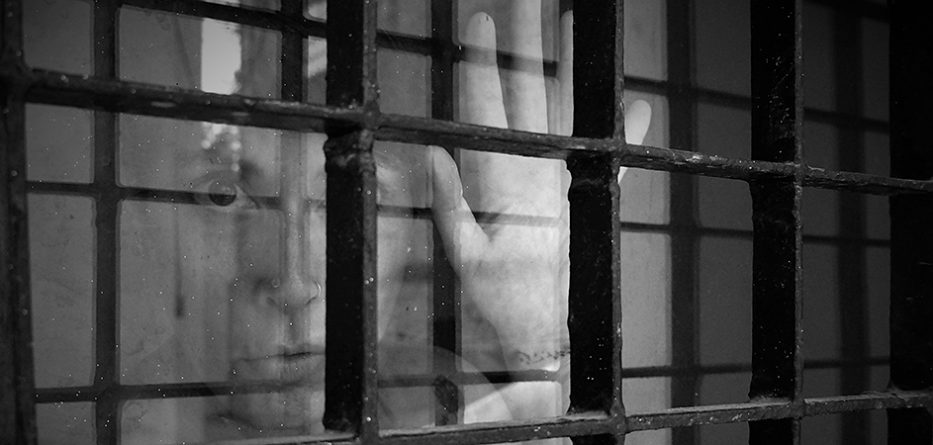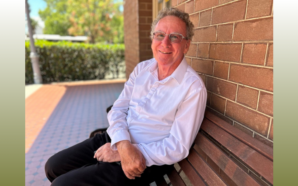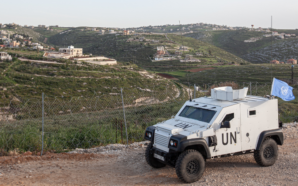Sister Abby Avelino is a Filipina and a Maryknoll Dominican religious. She has been in Rome since 2022 as the international coordinator of Talitha Kum, the International Network of Consecrated Life Against Human Trafficking, a body based at the International Union of Superiors General (UISG). Sr. Avelino came to this international coordinating role after learning about the reality of trafficking and exploitation in Japan and serving as Talitha Kum’s coordinating officer in Asia. In an interview with La Civiltà Cattolica, she retraced the different stages of her life, dwelling, in particular, on the challenges surrounding human trafficking and how to combat it, with a special focus on the accompaniment of victims and survivors.
Sr. Avelino shared with us her familiarity with “the voice of the vulnerable and exploited,” a familiarity based on her own experience of poverty and listening personally to many victims. Her words conveyed her conviction that “each of us has a role to play in the fight against human trafficking” and that in such a task, networking is indispensable. Also striking is the importance given, in the fight against trafficking, to the involvement of the victims themselves and the targeted segments of the population. Finally, regarding the requirements for those who engage in such a mission, Sr. Avelino is clear: “a compassionate heart and spiritual accompaniment,” adding that “emotional, physical and spiritual preparation is vital to engage in this ministry,” a ministry that involves a relationship of trust and in which the “transformative power of hope, compassion and mercy” is at the center.
We thank Sr. Abby Avelino for her availability and gladly share a report of our dialogue with readers.
Sister Avelino, you were born in the Philippines and emigrated to the United States of America with your family. There you graduated in mechanical engineering and later worked for a few years in that field. Then you joined the Dominican Sisters of Maryknoll. After initial formation, you were sent to Japan; today you are the international coordinator of Talitha Kum, the International Network of Consecrated Life Against Human Trafficking. Can you tell us more about the different stages of your life so far?
I am a religious and, as you said, I am originally from the Philippines. Before entering religious missionary life I worked as a mechanical and systems engineer. My pastoral mission initially took me to Japan, where I met and accompanied many migrants who came from all over the world, especially women migrants from the Philippines. I worked as a leader at St. Ignatius Church in Tokyo, a multicultural parish. I also worked at the Migrant Women Empowerment Center “Kalakasan” (“strength,” in the Tagalog language), which addresses the needs of migrant women who are victims of abuse or domestic exploitation. The encounters I had with numerous women deceived and exploited by traffickers triggered in me a determination to engage in the anti-trafficking ministry.
In 2016, we established Talitha Kum Japan in order to defend the rights and dignity of migrants, refugees and people on the move, who are often at risk of trafficking and exploitation. Later, I served as Talitha Kum’s coordinator for the Asian region: my job was to understand and respond to the needs of national networks in 16 countries. Finally, I am now in Rome as Talitha Kum’s international coordinator. The mission, however, is the same; I am a missionary at heart. I carry out the same mission in a different place, continuing the commitment and mission of Jesus. The heart of this vocation is to walk in dignity for and with God’s people.
Before you tell us about your current mission in Rome, would you like to share with us some more specific aspects of your work in Japan? What memories do you have of this country from a social and religious point of view?
Japan is a land where migrants arrive by the thousands every year, eager to find work that will enable them to support their families back home. In the early days of my ministry, I empathized with the plight of migrant women who came to church to find comfort and someone willing to listen to their plight. I still remember so many of those stories, and the faces of those who told them to me, not least because the voices of the vulnerable and exploited were familiar to me from having known poverty well in my own life. My father died when I was a child and my mother exhausted herself in supporting us, working two or three jobs at a time, as did my brothers. Like so many, we had to struggle to survive in my country, which is very poor.
It is this poverty that drives people to relocate and seek their fortunes elsewhere. In many cases these are women, who often marry local men. I used to meet them in St. Ignatius Parish in the heart of Tokyo. They would come to Mass and then, when they found out that I was originally from the Philippines, they would start telling me their story. It was always the same, a story of exploitation, domestic violence and abuse. Many did not even know how or why they had come to Japan, but they were all looking for help and protection.
Very recurrent are the cases of Japanese-Filipino Children (JFC), the children of Filipino women and Japanese men. This is a social category that is very vulnerable to human trafficking. Several unscrupulous recruiters target JFCs and their Filipino mothers. They lure them by offering visas to Japan, the possibility of citizenship, jobs and housing, and with similar inducements they exploit them by saddling them with huge debts. The recruiters then say, “you signed the contract”; “the procedures were done in the Philippines, so here we just collect what you owe.” This is a widespread phenomenon. In some cases, when the children are only a few months old, the mothers send them back to their families in the Philippines, because many cannot survive in Japan because of the high cost of living.
Later these children, once they become teenagers, return to Japan, but they are often exploited, abused and bullied. Some of them struggle so much to integrate into society because they do not speak the language; and many of them do not feel welcome. We have tried to help them find their identity, with a program that also involves their mothers. Talitha Kum Japan, since it started, has enabled us to identify many of these cases of JFCs and their mothers. But since emigrating to Japan for a JFC is both a right and an important opportunity, we need to ensure that they and their mothers have safe entry into Japan and the opportunity to work and integrate into society, without becoming prisoners of the trafficking system. This is a daunting challenge, which begins with raising awareness in those people of their rights and the need for Japanese language education.
There was a need, therefore, to create a system that would allow JFCs to come to Japan and connect with the Church. Talitha Kum created a strong network of collaboration with governmental and nongovernmental organizations, Catholic associations and various other religious groups.
What are your memories of your role as coordinator of Talitha Kum for Asia?
My role was to focus on the needs of the national networks in 16 countries, to give the appropriate response in each case. In Asia, we strengthen collaboration between source and destination countries by educating people and promoting safety training programs in source countries as early as the pre-departure stage.
With respect to the purpose of Talitha Kum Asia, which aims to reduce incidents of abuse in target countries, a common need across the continent is capacity building to learn how to identify and then accompany victims and people at risk. There have been many initiatives in this regard. In particular, we learned a lot during the pandemic, when the economic instability caused by Covid-19 made people more vulnerable to trafficking. During that period, 17 monthly webinars were organized, with an average of 250 participants per month.
At that time, networks in Asia expanded enormously, involving many religious congregations, and the Youth Ambassadors program was initiated: Talitha Kum ’s youth ambassadors project has become another primary component of anti-trafficking efforts, and is being promoted through interventions in schools, churches and among peers.
Let us now come to Rome and your work as international coordinator of Talitha Kum. How did this network come about and what are its goals?
Talitha Kum is a global network of women religious and collaborators officially founded in 2009 at the International Union of Superiors General (UISG). Its mission is to end human trafficking and exploitation through collaborative initiatives focused on prevention, protection, spiritual accompaniment, social reintegration and retraining of survivors. This combination of networks, present in 97 countries with more than 6,000 members including men and women religious, lay people and youth, actively pursues its mission to end human trafficking and all forms of slavery.
How do you carry out your role as international coordinator?
In Rome, I continue my commitment to proclaim God’s loving presence through service in mission, namely, my commitment to care, love and heal creation and people regardless of culture, race, creed, nationality, gender or age. I believe that each of us has a role to play in the fight against human trafficking. In fact, Talitha Kum’s identity and strength are rooted in grassroots engagement. My coordinating role is aimed at leading, maintaining and strengthening Talitha Kum’s networks globally, so as to ensure an ever-widening context of collaboration and networking with church bodies, national and international anti-trafficking organizations and agencies committed to this mission. For us, networking and collaboration are key components in the fight against human trafficking. Therefore, one of my tasks is to coordinate the strengthening of networks through decentralization and participation that increasingly involves local and regional levels.
The recent declaration “Dignitas Infinita” of the Dicastery for the Doctrine of the Faith includes human trafficking among the grave violations of human dignity. When we talk about trafficking, what reality are we talking about? Who are the victims? What circumstances lead to it? What geographical areas are most at risk?
Human trafficking is a global problem that affects the lives of many people, particularly those who are most vulnerable: women, children and youth, migrants and refugees. Wherever there is an influx of people on the move, trafficking flourishes. Globally, many populations are exposed to this risk as a result of numerous interconnected crises, such as, for example, the impact of the Covid-19 pandemic, internal conflicts in many countries (Myanmar, Sri Lanka, Syria, The Democratic Republic of Congo, Burkina Faso, Venezuela and other countries), wars in Ukraine and the Middle East, which have disrupted the lives of millions of people, and devastating natural disasters due to climate change. All of these crises are having a direct impact on human trafficking around the world.
There is also a phenomenon that operates outside geographical boundaries and political regions, and that is online exploitation through social media, where exploiters increasingly lure their victims with false promises and scams. Many very young people fall victim to a phenomenon that has been called Online Sexual Exploitation of Children (OSEC).
In the face of these issues with such broad and serious consequences, what answers does Talitha Kum offer?
Talitha Kum’s networks respond to trafficking, which continues to develop and expand, by improving the sharing of best practice and information. They preferentially focus on prevention, raising awareness at all levels, advocacy, training leaders, engaging survivors, building network capacity, and empowering youth as key players among their peers in the fight against trafficking.
The awareness gained by Talitha Kum about the phenomenon of human trafficking leads us to promote the widest possible involvement of all those fighting it. Collaboration at every level with organizations and networks is essential, as is the participation of young people in awareness-raising initiatives. We believe that the global, regional and local response of the Catholic Church should come through a strong and widespread commitment aimed at members of the younger generation to become active advocates for human dignity. Indeed, programs, coordinated responses and collaboration are much more effective if they are designed and implemented by the population actually targeted by this crime.
Educating and raising awareness among many young people in general, as well as students, will lead to reducing the number of victims and their vulnerability to various forms of exploitation, particularly trafficking. The activity of Talitha Kum’s youth ambassadors, who engage by intervening with their peers to prevent the occurrence of trafficking conditions, was born in networks in Asia and the Middle East and is now also present in Africa and Latin America.
Another major initiative has led to the preparation of a safe social media app for young people, in multiple languages. This is also a place to help prevent trafficking, involving young people as leaders and raising awareness of the phenomenon.
In practical terms how are trafficked persons accompanied? How do they escape the terrible reality of exploitation? How do we heal the wounds of survivors?
We meet victims in various contexts of vulnerability: women and children oppressed by the sex trade and labor exploitation, undocumented migrants, people in detention, asylum seekers, and vulnerable people affected by war and conflict. We protect all of them by supporting their return home, access to justice, and psychosocial support. We establish a relationship of trust by meeting their physical and spiritual needs.
What follows is an example of international support. It was necessary and valuable to work together when we encountered the case of an African woman who was trafficked in an Asian country. We coordinated as best we could to locate her and bring her home safely through collaboration with the International Organization for Migration and, subsequently, to connect her with our sisters on the ground to facilitate her recovery and integration. This is certainly not an isolated case: in 2023, Talitha Kum assisted and supported 39,081 victims and survivors in this area of intervention. We owe this to partnership and networking with international NGOs, as well as collaboration between various congregations and other commissions and agencies at the national, regional and international levels. It has also facilitated the building of advocacy pathways. We do not work alone.
How do you combat trafficking, which has such powerful resources at its disposal? How do we address the disproportion between those who seek to prevent trafficking and free its victims, and those who promote and foster it?
The Church, as a community, is summoned to embrace the transformative work that God is doing in the world. We continue to invite all who have relevant reasons, in any capacity, to join our journey to put the power of change into action. For us as a Church, it is a call to action, to work together – aiming at civil society, NGOs and other organizations – alongside governments, international organizations and other agencies. There is a real need to involve everyone, individuals, families and communities, even more than politicians, law enforcement and so on. Together we embark on a synodical journey to open our eyes and ears to what is happening in the communities around us.
Talitha Kum is a network, an umbrella of networks of congregations of women religious. We are committed to strengthening each other in the fight to end human trafficking, and, simultaneously, to strengthen our inclusive model of collaboration. We work to prevent trafficking: our global approach is through raising awareness of the problem, through education of vulnerable youth in particular, and more broadly of women and girls, migrants, refugees and those at imminent risk of trafficking and exploitation. By 2023, we reached 623,700 people worldwide with our prevention programs.
In your work, you come into contact with great suffering and exploitation. Can you give us some examples, recount some experiences?
We can talk about Pauline. When she was just 16 years old, she was a victim of exploitation and sexual abuse. Her existence was miserable. She did not know where to go. The exploiters were threatening her life and her mother’s life. Then, one day, she met the sisters of Talitha Kum and with them found a way to rise up and change her life. Today this survivor, and our advocate, has founded Rebirth of the Queen, a community that provides a safe space for survivors like her to give them a chance to rebuild their lives by leaving behind situations of death and despair. Pauline cultivated a dream of building a shelter for trafficked survivors. Her story is summed up in these words, Talitha Kum! Arise!
The Spirit of God, which calls all of us together to the work of ending human trafficking, is the same Spirit that has been present and working since the beginning of time to bring life to light and to set God’s people free. The fruits of this Spirit, and this spirituality, echo in the work done over the past 15 years by Talitha Kum networks, promoting human dignity, love and respect for life and inspiring collaboration, networking and transformation.
What would you say to those who want to collaborate in your mission? In particular, for women religious, what human and spiritual qualities are required? Is specific preparation needed?
Listening skills, a compassionate heart and spiritual accompaniment are required; these are the keys to walking together with survivors and opposing human trafficking. Emotional, physical and spiritual preparation is vital to engage in this ministry. Talitha Kum International organizes periodic trainings aimed at women religious to increase their understanding of the challenges related to preventing trafficking and assisting victims, to make actions within the network increasingly consistent, and to improve the exchange of experiences and the effectiveness of activities. Talitha Kum continues to offer a pedagogical journey to experience the dignity and care of people, and thus to learn more details about trafficking, how to reduce the risk of being trafficked, and how to help survivors on their journey to freedom and social reintegration.
Pope Francis has denounced human trafficking more than once in strong terms “It is a vile activity, a disgrace to our societies that claim to be civilized!” – he said in his address to participants at the plenary of the Pontifical Council for the Pastoral Care of Migrants and Itinerant People on May 24, 2013. More recently, on the occasion of the 2nd General Assembly of Talitha Kum, he said it is “one of the most terrible scourges of our time.” Do you feel the closeness and encouragement of the pope and the dicasteries of the Roman Curia? Are there any forms of collaboration?
Pope Francis has been very supportive since the beginning of his pontificate. His recent encouraging message during the Second General Assembly last May gives us more strength, resolve and hope. The pontiff urges the Talitha Kum network to continue to “stand by the victims, listen to them, help them get back on their feet and together take action against trafficking.”[1] His messages, particularly on the International Day of Prayer and Awareness against Human Trafficking, hearten and inspire more young people to join the cause.
Each year, Talitha Kum coordinates with other organizations an international Day of Prayer and Awareness that is celebrated on February 8. Since its inception in 2015, the Holy Father has endorsed this Day at the UISG, with the Union of Superiors General (USG) as promoters. Coordination is entrusted to Talitha Kum at the international, regional and national levels along with numerous partner organizations, particularly the dicasteries of the Roman Curia. It is an opportunity to come together in prayer, reflection and awareness regarding the evil of trafficking and to discover the power of joint action for the care, healing, promotion and recovery of victims, survivors and individuals at risk.
Our Call to Action encourages all stakeholders and others involved to join religious women in prayer and reflection on this day. Pope Francis joins us in communion each year in prayer and action. The International Day is a call to all people of good will, youth and children, people of different religious beliefs and traditions, cultures and generations, to make this journey together, as pilgrims in the cause of human dignity, with hope, ideals and practical measures against all forms of exploitation and human trafficking.
Pope Francis also very frequently emphasizes the importance of women in the life of the Church. In the Vatican and the Roman Curia he has appointed women to roles of great responsibility. You yourself have a role of great visibility and importance. How do you, for your part, understand the role of women in the life of the Church?
Our role as women is vital, particularly with respect to the issue of “human dignity.” Talitha Kum is rooted in the long and rich tradition of Catholic women, inspired by the life-giving ministry of Christ, engaging in community through work and collaboration, following the example of the Triune God. Our faith and spirituality remind us that God can transform even the most hopeless situations and can raise to new life what seems dead. Talitha Kum members globally continue to do their part by caring, healing, empowering, recovering and participating in the lives of victims, survivors and populations at risk of trafficking and exploitation. It is the healing hand of hope, guided by the Spirit, to rise up!
Talitha Kum appeals to the transformative power of hope, compassion and mercy, which defines the mission of our global network, “Courage, arise!” Our call is to stand with victims and survivors, to share their journey, to support their humanity, and to embrace the example of Jesus in caring for and with the little ones: women, migrant populations, refugees, and those on the margins. We hope that our commitment as women can be an inspiration and can promote much needed change.
Finally, what were the main conclusions of your second General Assembly meeting in May 2024? What plans do you have for the future?
This year marks the 15th anniversary of Talitha Kum. Let us continue to walk together to end trafficking: compassion in action for transformation is our catch-cry. This was one of the themes of the second General Assembly. We renewed our commitment to implement our three priorities for 2025-2030, the result of discernment using the synodal approach of Conversation in the Spirit: addressing systemic change at all levels; deepening the holistic survivor-centered approach; and expanding collaboration and networking at all levels.
With its call to action, Talitha Kum advocates a change in the dominant paradigm on the legal, social and economic justice fronts for trafficking victims, survivors and those at risk of falling into the traps of traffickers and exploiters. Many victims and survivors remind us of the need to establish rules and regulations that support the development of men and women as persons and welcome members of their communities. But above all, it is important to promote a culture of dignity and an economy of care.
We dream of a world without human trafficking. This is a call that must involve the whole of society, government and Church leaders at all levels. Together, we believe that our actions have the power to transform lives with compassion, working toward a world free of human trafficking.
DOI: https://doi.org/10.32009/22072446.1124.17
[1]. Francis, Address to participants at the meeting sponsored by the international network “Talitha kum”, May 23, 2024.
Reproduced with permission from La Civiltà Cattolica.








